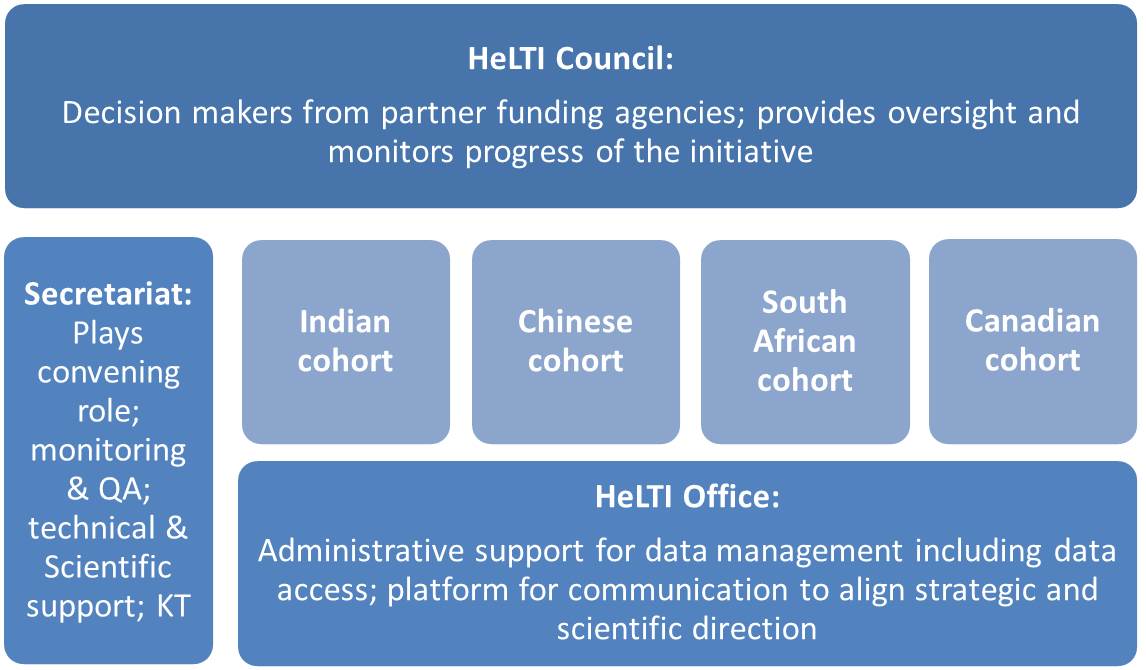Healthy Life Trajectories Initiative (HeLTI): components
HeLTI is comprised of distinct but complementary arms. These components coordinate and build upon both the diverse research capacity and wealth of existing data sets in Canada, while using a unique set of coordinated linked international intervention cohorts to focus the powerful DOHaD approach specifically on NCDs both in Canada and in countries where the burden is greatest.
1. Canadian Interdisciplinary DOHaD Team Grants – Implications for Men, Women, Boys and Girls (funded from April 2016 - March, 2021)
The goal of the interdisciplinary teams was to improve health through an increased understanding of how biological, social and environmental exposures impact human health and development. Each multi-disciplinary team engaged both basic and social scientists, and included a focus on sex and gender outcomes. By supporting multi-disciplinary research teams that focus on DOHaD research, CIHR is building capacity in the DOHaD field. In addition, the teams were encouraged to consider the ultimate policy implications of their research.
Five teams were funded from April 2016 – March 2021.
2. Enabling Platform: Canadian DOHaD Cohort Registry (funded from April 2016 - March, 2021)
The Research Advancement through Cohort Cataloguing and Harmonization (ReACH) project developed a registry of Canadian cohorts that were using a DOHaD approach. ReACH acted as an enabling platform of HeLTI, allowing researchers to build upon it and utilize it as a template for harmonization. Designed to be a national resource to facilitate cohort translational research, ReACH fostered and enhanced the use of data and biological samples collected by Canadian DOHaD cohorts. ReACH enhanced Canada’s position as an international leader in big science and large-scale collaborations, and enabled the research community to better share data across cohorts to address increasingly complex health research challenges.
The DOHaD registry was funded from April 2016 - March 2021.
3. HeLTI Linked International Intervention Cohorts (LIICs)
Linked International Intervention Cohorts (LIICs)
Through a unique research collaboration between Canada, China, India, South Africa and the World Health Organization (WHO), HeLTI is supporting the development of LIICs.
Four joint international cohorts that span basic science to public health research have been established - each with a lead researcher from Canada and a lead researcher from the participating country. In each country, the team is working to establish an intervention cohort composed of a representative sample of the target population. Together, the cohorts will implement prospective interventions focused on risk factors for NCDs.
The interdisciplinary teams are supported by joint funding from CIHR, the National Natural Science Foundation of China, Department of Biotechnology of India, and the Medical Research Council of South Africa. This international collaboration will enable comparative analysis of interventions, harmonized data, assessment of biological mechanisms and biological-environmental interactions in different populations, as well as sharing of expertise. It is this collaborative approach that will allow HeLTI to have greater impact than if studies were implemented as single-country projects.
The cohort in China was funded in July 2016, the South Africa and India cohorts were funded in February 2017, and the Canadian cohort was funded in July 2017.
HeLTI Office
The HeLTI Office supports the LIICs by providing administrative support for data management including data access as well as a platform for communication to align strategic and scientific direction.
The HeLTI Office was funded through the Canadian LIIC in July 2017.
WHO Secretariat
The WHO Secretariat provides scientific and technical support, advice and quality assurance to the various HeLTI governance bodies in order to optimize the collaboration and synergize the scientific activities of the HeLTI LIICs.
The WHO Secretariat was funded in April 2017.

Long description
The components of the HeLTI LIIC Governance: The HeLTI Council provides oversight to the initiative and comprises the decision makers from the partner funding agencies; The cohorts (India, China, South Africa and Canada) are supported by the WHO Secretariat that convenes the HeLTI governance committees and technical activities and the HeLTI Office that provides the administrative support for data management.
- Date modified: